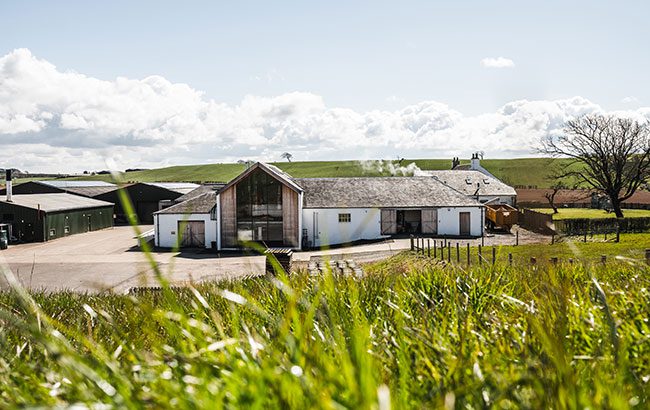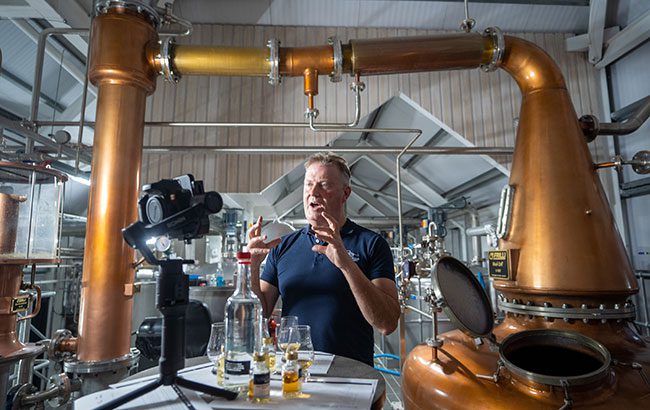How long can Scotch producers protect consumers from rising costs?
Scotch producers are having to cope with rising energy prices, and adapting their distilleries to use green technology. But how much longer until costs will be passed to consumers?

*This feature was originally published in the August 2023 issue of The Spirits Business magazine.
Anyone who has stood in a still room while the distillation process is taking place can attest that this is not a process that is light on energy. It is hard not to be awed by the power of vast copper kettles running at full throttle, and the resultant sauna-like conditions they create. But all that energy comes at a price, one that has been rising exponentially in the past two years, which has effects that are being felt far beyond the still house.
Fife-based Crafty Maltsters comprises farmers and maltsters, meaning it is hit with the double whammy of rising fertiliser prices on the grain production side, and rising energy costs on the malting side. Founder Alison Milne says in the past two years its fertiliser costs have risen by 60%-70%, equating to around £40,000 (US$51,415) in additional costs, an increase she says is almost impossible to absorb when its selling price has not risen to the same extent.
To try to limit the energy costs, the company has explored alternative solutions in terms of green energy supply but could find no solution that didn’t require massive capital outlay, which was not achievable on top of the capital expenditure for buildings and equipment. She says: “In addition, it was difficult for us to find a renewable solution that would achieve the high temperatures required in the consistent manner that malting demands.”
Rising costs
David Ferguson, commercial director at Lochlea Distillery in Ayrshire, says that as a farm distillery, it has been spared some of the damage that rising costs have inflicted on the industry, but it still cannot escape unscathed: “Our input costs have increased significantly in the past 12 months, mainly driven by rising gas prices. We are now seeing these come back down, and thankfully we have been able to offset through cost advantages elsewhere. The fact that we grow our own barley here at the distillery protects us from another area that has seen huge price hikes recently.”
A green ethos was a guiding principle of Nc’nean distillery on the Morvern peninsula from its inception. But as founder Annabel Thomas explains, it too is facing a rise in the price of energy. “We are lucky to operate off renewable energy, in our case biomass,” she says. “We buy the timber in advance and in bulk, which means we have been somewhat protected from recent changes, and have a long-term electricity contract as well. Having said that, the market price of biomass has gone up, so we’ll suffer the consequences eventually, just not quite yet.
“What is interesting is that when we were first looking at putting the biomass boiler in, 10 years ago, the economics were hard to make work. The investment case versus oil or gas didn’t really stack up. We did it because we felt it was the right thing to do. But now, given where energy prices are, the economics look quite different.”
For Alasdair Day, co-founder and master distiller at Isle of Raasay Distillery, the increase in energy prices comes at a time when the distillery’s costs are rising across the board. Day says its energy costs have soared by 30% in the past 12 months, while malted barley costs this year have climbed by more than 50%, with peated malted barley having an additional premium: “This and the increase in energy prices means that our production costs for a litre of alcohol have doubled. With whisky being a very long-term business, we have no option other than to absorb these costs in the short term, but inevitably the cost of a bottle of whisky in three to 10 years’ time will be more expensive as a result.”

Gareth Roberts, founder and director of Organic Architects in Helensburgh, who was involved with the Lindores Abbey and Ardnamurchan distilleries, says the most cost-effective option for a distiller looking to transition to more energy-efficient production methods is to replace equipment as it wears out: “However, it will take a long time to produce any significant effect on the cost per litre. Capital costs must be seen in the round, and any calculations must include the costs of building, so making fundamental changes can pile cost on top of cost.”
He also says this isn’t just about lowering costs. “The entire industry has no choice but to change away from fossil fuels, and there is increasing pressure on brands to be seen to be green,” he continues. “Given these pressures, it seems that many distillers will be forced to make significant investments over the next few years to reduce their environmental impact and benefit their brand, while eventually reducing production costs in the long run.”
The long run
It is, after all, an industry that operates on the long run. Whisky producers think in decades, and even distilleries that have existed for a century can still adapt and evolve. Glentauchers in Speyside was established in 1898, but in more recent times was the site of a modern experiment by its owner, Chivas Brothers. State-of-the-art heat-recovery technologies, including mechanical vapour recompression and thermo vapour recompression, were developed at the distillery to capture and recycle heat generated in the distillation process that would otherwise go to waste. These innovations have reduced total energy consumption by 48%, cutting the site’s total carbon emissions by 53% as a result. This represents an energy-saving equivalent to powering 4,979 average UK homes for a year. Chivas Brothers released all of the data from this project so other distillers could benefit from its experience.
Jean-Etienne Gourgues, CEO and chairman of Chivas Brothers, says the decision to release this information was about ensuring the best possible future for the industry: “We recognised that findings from these processes stood to benefit our industry at large, which is why we made our engineering findings open source in July 2023, enabling other producers to consider the use of such technologies in their own operations.
“We firmly believe in these technologies. However, we must recognise that they come at a cost to implement – requiring not only downtime in operations, but considerable upfront expenditure. It’s these pressures – to pursue a green agenda, and continue to produce whisky at scale to meet growing consumer demand – that we must balance at the industry level.”
If the rise in energy prices were causing headaches for the industry, the crisis has only been deepened by the UK government’s decision to implement a 10.1% spirits excise increase from 1 August, raising the tax take from 70% to 75% of the average-priced bottle, something the Scotch Whisky Association (SWA) campaigned against.
Competitive disadvantage
Graeme Littlejohn, director of strategy and communications at the SWA, says the 10.1% duty increase is the biggest tax rise in four decades: “To make things worse, Scotch whisky and other spirits will be put at a further competitive disadvantage in pubs, bars, and restaurants because distillers will not be able to access tax breaks that are available to beer and cider. Scotch whisky accounts for around 4% of all alcohol consumption in the UK, but accounts for 6% of total alcohol revenue for the Treasury.”
Littlejohn points out that while taxes on whisky were being increased, producers were unable to access the UK government’s energy bill relief scheme – despite other parts of the alcohol industry being included. “This is hugely disappointing, and we still have not had an explanation from the Treasury as to why they have decided that distilling – one of the most energy-intensive parts of the Scotch whisky-making process – is not eligible for relief,” he says.

Scotland’s energy minister, Gillian Martin, told The Spirits Business that the Scottish government was doing everything in its power to support businesses struggling with high energy bills, pointing to its Business Energy Scotland service, which offers free advice for Scottish SMEs and a pathway to financial support. Martin adds: “The UK government has meanwhile continually failed to take the necessary steps – which only it can take – to mitigate the impact of high energy prices on Scottish business. Its significant cut in support for businesses with energy costs is extremely concerning – not least for Scottish whisky businesses, which are continuing to deal with the ongoing impact of Brexit and now the further blow of a rise in duty.”
A spokesperson for the UK government’s Department for Energy Security and Net Zero said: “We acted swiftly to provide businesses with unprecedented support, saving them £7 billion [US$9bn], and enabling some to only pay around half of predicted wholesale energy costs. Our support is continuing through our Energy Bills Discount Scheme.”
The industry is working to manage its energy costs without passing them on to consumers. David Ferguson, commercial director of Lochlea, says the firm controlled its costs well this year, to the point where it made savings on materials. But he says the tax increase was another unwelcome challenge for the industry. “However, we will manage this in partnership with our customers. We are absorbing some of the increase for a period to shield consumers from an immediate increase in RRP.”
But the added costs can only be absorbed for so long, and, as Littlejohn points out, rising costs also mean less available funds to invest in making a production process greener. “Distillers will weather the storm, but the more the industry has to spend on energy bills and tax the less there is to invest in further growing the sector, and continue on the journey to decarbonisation,” he adds.
From those already operating as energy-efficiently as possible, there is a message of hope. Thomas says while costs at Nc’nean are rising, she feels confident about the future: “Demand for sustainably made modern whisky has never been stronger. Much like managing the inflation we are seeing, I see the duty rise in the same way – unwelcome and a challenge, but just something we have to manage as best as possible. As a small business we have to focus on the things we can control rather than what we cannot.”
Related news
Golf drives Glen Moray push in UK travel retail
